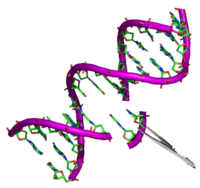
Photo from wikipedia
In Germany, products derived from livestock who were fed GMO are not required to be labeled as GMO. However, non-GMO labeling requires compliance with the national public non-GMO production standard,… Click to show full abstract
In Germany, products derived from livestock who were fed GMO are not required to be labeled as GMO. However, non-GMO labeling requires compliance with the national public non-GMO production standard, including a confirmation that no GM feed was used. In addition to the national standard, firms can adopt a private collaborative certification standard set by a multi-stakeholder organization. Using a survey of German dairies, we show that firms with more suppliers were more likely to adopt the multi-stakeholder standard or to stay conventional if their perceived risk of reputation loss and liability issues for non-GMO production were higher. Firms with lower perceived risks were more likely to comply only with the public standard for non-GMO labeling (i.e., not adopt the private standard). We discuss how potential incongruent interests of the various stakeholders that set the private production and certification standard may have incentivized firms to adopt the non-GMO standard in the initial phase after the introduction of the labeling option.
Journal Title: Food Policy
Year Published: 2018
Link to full text (if available)
Share on Social Media: Sign Up to like & get
recommendations!